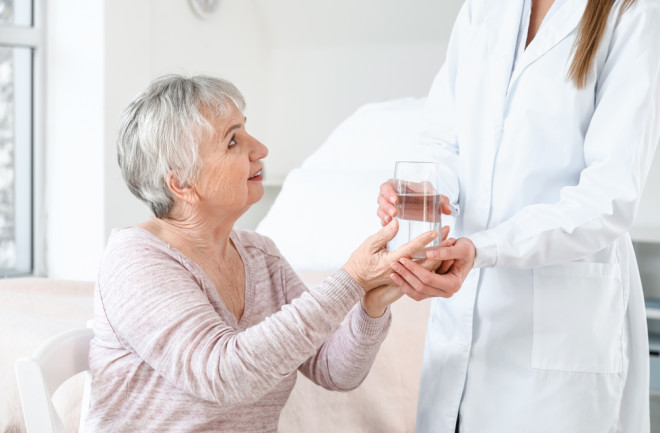For some seniors, enjoying good health during their golden years could be as simple as staying hydrated. In a January 2023 article in The Lancet, researchers followed more than 11,000 participants for 25 years and found the most hydrated were less at risk for chronic diseases and premature death.
People become less hydrated as they age, and the authors concluded that having a hydration routine could help a person slow the aging process.
Dementia patients, however, aren’t always able to communicate when they are thirsty or even recognize when they need a drink. For caregivers, preventing dehydration can be an ongoing challenge that involves difficult decisions.
Why Do Older People Get Dehydrated?
The human body is typically made up of 60 percent water. But as people age, their muscle mass reduces, which lowers their body composition to about 50 percent water. This change in water weight means that a drop in water consumption feels more drastic to the system.
Many seniors experience a drop in water consumption that leads to chronic dehydration. There are several reasons why older people don’t drink as much water as they should. Some seniors experience a decrease in their sense of thirst. They simply don’t have an urge to drink water even if their body is dehydrated.
Other people might take medication that reduces their body’s water weight. Some seniors might find changes to their kidney function that mean they don’t hold onto as much water.
Drinking less water can also be due to social concerns. If a person is experiencing incontinence, they might limit their water intake in order to avoid an accident. Similarly, a person who has to get up several times in the middle of the night to visit the bathroom might avoid drinking water in hopes of reducing their overnight disturbances.
Read More: How to Diagnose Dementia: Can You Get Tested for Dementia?
Why Do Dementia Patients Get Dehydrated?
In addition to all of the reasons why seniors become dehydrated, dementia patients also go through neurological changes that further affect their water intake. As a person’s dementia progresses, they may no longer recognize food and drink items. They can become averse to certain flavors, smells, or food textures and then refuse to eat.
As the disease progresses, the person may lose their instinct to feed or hydrate themselves. In the later stages of the disease, they will lose the ability to eat or drink on their own. In the terminal stage, about 80 percent of dementia patients experience dysphagia, which is the inability to swallow.
Read More: How to Talk to Someone With Dementia
How Do You Keep a Dementia Patient Hydrated?
Caring for a person with dementia is stage-based. Patients who are earlier in their disease progression can be reminded to eat or drink. Researchers who study dementia care recommend giving food and beverages to patients who can comfortably swallow. Caregivers can offer interesting cups or flavored waters in order to encourage the patient to hydrate.
As the disease progresses, the patient’s family and medical team will have to develop a care plan that might involve feeding tubes and intravenous fluids. If this occurs, researchers say the care team should give special care so that the patient’s lips and mouth are frequently moistened in order to avoid cracking, chapping, and other discomfort.
Read More: The Best Dementia Treatment For All Ages in Life
Is Dehydration Fatal to Dementia Patients?
Toward the end stages of the disease, dehydration may be a contributing factor in the person’s cause of death. Dementia isn’t considered a terminal disease. Instead, it causes neurological and then physical changes that lead to a loss of function. The inability to swallow, for example, greatly reduces the person’s food and water intake. The person is also more likely to aspirate food or bacteria into their lungs, which can lead to pneumonia.
Because there is currently no cure for dementia, the loss of bodily functions cannot be avoided. Currently, researchers do not agree on the best care plan for people who need artificial nutrition and hydration. Some argue studies have confirmed that feeding tubes and IV lines are too painful for dementia patients to endure. Others worry death from dehydration is far more painful.
As researchers call for more empirical data to identify the best care plan, advocates warn the world is on the verge of a crisis. There are currently 55 million people globally who are living with dementia. By 2050, the amount will soar to an estimated 138 million. About 71 percent of these diagnoses will be given to people living in lower and middle-income countries.
Read More: How Does Dementia Cause Death?

